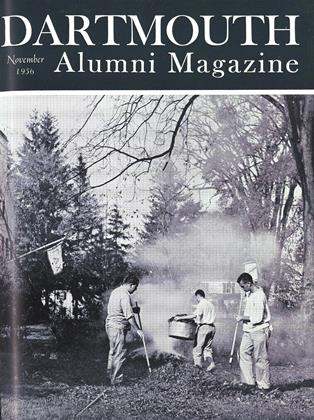They call it the "Trojan Horse." It is three by five feet at the base and stands about seven feet high. The outside is masonite and the inside is a complex of electrical circuits. To a layman it looks like a mechanical brain and sounds like a cross between a pinball machine and a cement mixer. In spite of how it looks and sounds, however, it may give new insights into human behavior. Dave Maline '57 completed it recently in the Department of Psychology workroom in McNutt Hall.
Dave attended the public schools in Bridgeport, Conn., where his father is with the Metropolitan Life Insurance Company. He planned to attend Dartmouth when he was in seventh grade and when time came to apply for college he filled out only one application. In the interim there were summer vacations at Lake Winnipesaukee, salt water fishing with his father and sister (she is now a sophomore at Simmons), golf ("just fair"), the usual extracurricular activities, piano lessons (he hated them), and a first prize at the Connecticut Science Fair, where his exhibit on the development of man included ceramic skull models.
At Dartmouth, Dave sailed along as an average student until he took some courses in Psychology and then it happened: he caught fire. He started spending more time on his courses; he got more out of them. In one Psychology course, the class was asked to do a simple project. Dave put everything into it and came up with a project so detailed and thorough that, says his professor, it would have been wholly acceptable as a senior thesis. It gained him a commendation on his permanent record card. And there was a course in Zoology where he got a taste of working on his own. "Look around," his professor said, "see what you find."
Last year, a Pychology course with Dr. Edward J. Green on animal learning processes set the opportunity he had needed. Dave's work in the course indicated that he could move out on his own, and with Dr. Green's help he developed his Senior Fellow project. The project called for the use of a testing device, similar to those used in studying animal behavior, to see if there is a correlation between how the lower animals learn and the human learning process.
Dave's time, as a Senior Fellow, is his own, but he has been spending it recklessly. The lights burn late in the Psychology workshop as he probes the innards of the Trojan Horse. Dave has had to learn it all from the soldering up, but he learns quickly. "You only have to tell him once," Dr. Green says. "And it's a good thing - one connection misplaced, and the whole project would go haywire."
Although Dave doesn't have to attend classes, he sits in on several. He is an assistant in Psychology 45, and works part of two days a week in the out-pa-tient section of the hospital. He plans to go on to Medical School and thinks now that he will specialize in Pediatrics because of his fondness for children. He spent last summer as a tutor for the ten-year-old son of Pat Weaver '30.
The Trojan Horse will be busy for most of the year, clanking and snapping as if it were about to gallop away. Dave will write up the preliminary findings in the spring and, although psychologists are as conservative as football coaches on Saturday mornings, you can't miss their enthusiasm and the hint that Dave's project may very well make an important contribution to our knowledge of how we learn.
David B. Maline '57
 View Full Issue
View Full Issue
More From This Issue
-
 Feature
FeatureThe Poet as Teacher The Poet as Teacher
November 1956 By RICHARD EBERHART '26 -
 Feature
FeatureThe Convocation Address
November 1956 -
 Feature
FeatureFinancial Report for 1955-56
November 1956 -
 Feature
FeatureClub Officers Hold Conference
November 1956 -
 Class Notes
Class Notes1926
November 1956 By HERBERT H. HARWOOD, H. DONALD NORSTRAND, RICHARD M. NICHOLS -
 Class Notes
Class Notes1918
November 1956 By ERNEST H. EARLEY, W. CURTIS GLOVER, RICHARD P. WHITE
R. L. A.
-
 Article
ArticleSenior With a Sideline
May 1952 By R. L. A. -
 Article
ArticleSkimeister
March 1955 By R. L. A. -
 Article
Article75th Year Captain
October 1955 By R. L. A. -
 Feature
FeatureTo Make What's Good Better
February 1951 By R. L. A. -
 Article
ArticleSinging Manager
March 1957 By R. L. A. -
 Article
ArticleThe People's Choice
May 1981 By R. L. A.
Article
-
 Article
ArticleTHIS PROM THE BRITISH
DECEMBER 1930 -
 Article
ArticleD. O. C. Aids Byrd
November 1933 -
 Article
Article23,736 Alumni
October 1946 -
 Article
ArticleOutstanding Class Accomplishments: 1949 Alumni Fund
March 1950 -
 Article
ArticleThe Competition was a Draw
OCTOBER 1998 -
 Article
ArticleThe Undergraduate Chair
December 1939 By Richard E. Glendinning Jr. '40

